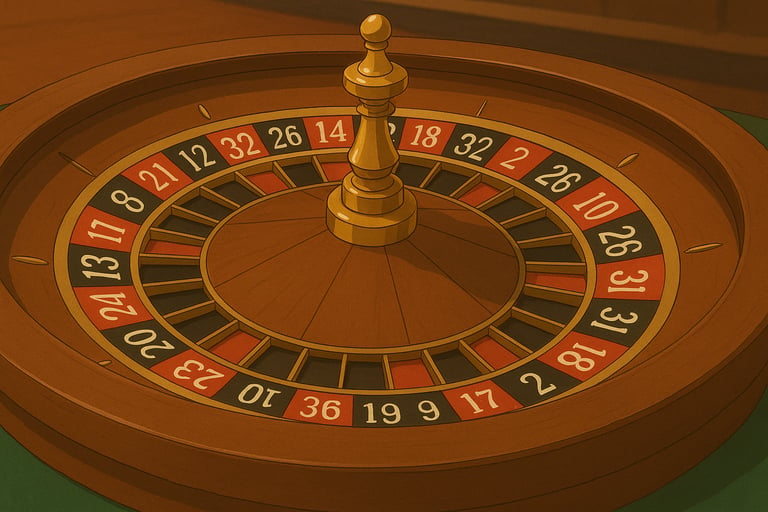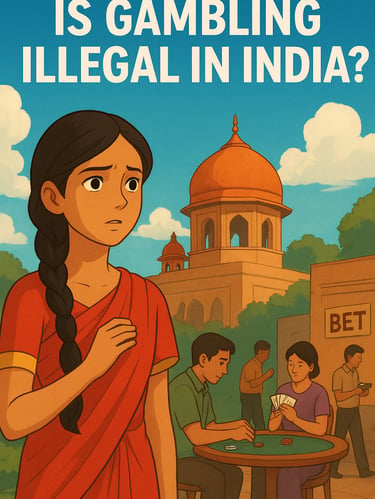Is Gambling Illegal in India? Laws, Online Betting & Casinos Explained (2025)
Discover if gambling is illegal in India. Learn about laws, online betting, casinos in Goa & Sikkim, fantasy sports legality, and the future of gambling.
CASINO GAMESAWARENESSCASINO TIPS
9/13/20254 min read
Is Gambling Illegal in India? A Complete Guide to Indian Gambling Laws (2025)
Introduction
The question “Is gambling illegal in India?” has always sparked curiosity among players, lawmakers, and investors alike. With India’s growing interest in casinos, online betting, fantasy sports, and poker, it is crucial to understand the legal landscape.
The Indian gambling market is estimated to be worth billions, but its legal framework is complicated. While some forms of gambling are legal, others are banned depending on state laws. Moreover, the rise of online gambling platforms has added another layer of complexity.
In this blog, we will break down India’s gambling laws, explain what is legal and what is not, and explore the future of gambling in India.
Gambling Laws in India: An Overview
Gambling in India is primarily governed by a central law called the Public Gambling Act, 1867. However, this law is outdated and does not cover modern-day online gambling. As a result, each state has the right to make its own rules regarding gambling and betting.
Key Points:
Public Gambling Act, 1867: Prohibits running or visiting a public gambling house.
Skill vs. Chance: Games of chance are largely banned, but games of skill are generally legal.
State Control: Each state decides whether to allow gambling or ban it.
This means gambling is not universally illegal in India—it depends on where you are, what game you are playing, and whether it’s skill-based or chance-based.
What Types of Gambling Are Legal in India?
Despite restrictions, certain types of gambling are legal in India. Let’s look at them:
1. Lotteries
Many states, including Maharashtra, Kerala, and Punjab, allow state-run lotteries. These are one of the largest sources of government revenue from gambling.
2. Horse Racing & Betting on Sports of Skill
Horse racing has been declared a game of skill by the Supreme Court of India. This means betting on horse racing is legal if conducted at licensed venues.
3. Rummy and Poker
The Supreme Court has ruled that rummy involves substantial skill.
Some states permit rummy clubs and online rummy platforms.
Poker’s legality remains debated, but in some states, it is treated as a skill-based game.
4. Casinos in Goa, Sikkim, and Daman
Casinos are legal in specific states like Goa, Sikkim, and Daman. Tourists and locals can enjoy slot machines, poker, roulette, and blackjack in licensed casinos.
5. Fantasy Sports
Platforms like Dream11, MPL, and My11Circle operate legally in most states because fantasy sports are considered skill-based rather than pure gambling.
What Types of Gambling Are Illegal in India?
The following gambling activities are generally illegal in most states:
Sports Betting: Except for horse racing, betting on cricket, football, or other sports is banned.
Online Casinos (Unregulated): Many international online casinos operate in India, but they are not legally licensed under Indian law.
Matka Gambling & Street Betting: Popular but strictly illegal, often associated with underground gambling networks.
Unlicensed Lotteries: Only government-approved lotteries are legal; private ones are banned.
Online Gambling in India: The Grey Area
With the internet, the question of “Is gambling illegal in India?” has become more complex. Online gambling is not directly covered by Indian law, creating a grey area.
Current Scenario:
Indian players often use international betting websites that operate outside India.
States like Sikkim and Nagaland have issued licenses for certain online gaming platforms.
Some states, including Tamil Nadu and Telangana, have banned online gambling and rummy apps.
Payment Gateways & Online Transactions
Most players deposit money into online gambling sites using:
UPI
Netbanking
Cryptocurrency (Bitcoin, Ethereum, etc.)
While playing is not outright illegal for individuals, operating an online gambling business without a license in India is prohibited.
Skill vs. Chance: The Legal Distinction
The Supreme Court of India has repeatedly emphasized the difference between skill and chance:
Games of Chance: Roulette, slot machines, dice games – mostly illegal.
Games of Skill: Rummy, fantasy sports, horse racing – legal in most states.
This distinction plays a huge role in determining whether gambling is legal or not.
State-Wise Gambling Laws in India
Since gambling is a state subject, laws differ across regions. Here’s a breakdown:
States Where Casinos Are Legal:
Goa – Both onshore and offshore casinos are permitted.
Sikkim – Limited number of licensed casinos.
Daman – A few licensed casinos operate.
States With Online Gaming Regulation:
Nagaland – Licenses for skill-based online games.
Sikkim – Permits online betting within state boundaries.
States With Strict Gambling Bans:
Tamil Nadu
Telangana
Andhra Pradesh
These states have explicitly banned most forms of gambling, including online rummy.
Penalties for Illegal Gambling in India
The penalties vary depending on the state and type of gambling:
Running a Gambling House: Fine of up to ₹200 or imprisonment up to 3 months (under Public Gambling Act, 1867).
Participating in Illegal Gambling: Fine of up to ₹100 or imprisonment up to 1 month.
Online Gambling Operators Without License: Can face criminal charges, heavy fines, and shutdown.
Although these penalties may seem small, modern laws in certain states impose much stricter punishments, especially for online gambling.
The Future of Gambling in India
With the rise of digital payments, crypto, and online platforms, India’s gambling industry is growing at a rapid pace. Experts believe India will eventually regulate online gambling instead of banning it.
Reasons for Legalization Push:
Billions in tax revenue potential.
Control over illegal underground betting markets.
Protection of players through regulations.
Job creation in the gaming and entertainment industry.
Countries like the UK, USA, and Singapore already have regulated online gambling frameworks. India may follow a similar path in the future.
FAQs About Gambling in India
1. Is gambling completely illegal in India?
No. Gambling is a state subject, and some forms like horse racing, rummy, lotteries, and casinos in certain states are legal.
2. Is online gambling legal in India?
Online gambling exists in a grey area. Some states have legalized skill-based games, but most forms remain unregulated.
3. Can I legally play poker in India?
Poker is considered a game of skill in some states, but others classify it as gambling. Its legality depends on where you play.
4. What happens if I gamble illegally?
You may face fines or short imprisonment, depending on state laws. Operators face harsher penalties.
5. Which Indian states allow casinos?
Goa, Sikkim, and Daman are the only states where casinos are legal.
Conclusion
So, is gambling illegal in India? The answer is not entirely. Some forms of gambling, like horse racing, rummy, fantasy sports, and state lotteries, are legal. Casinos operate only in a few states, while online gambling remains in a legal grey zone.
As India’s gambling industry continues to expand, the government may soon introduce clearer regulations. For now, the legality of gambling in India depends on the type of game, your state laws, and whether it’s skill-based or chance-based.
If you’re planning to gamble in India—whether offline or online—make sure to check your state’s laws to avoid legal trouble.
Reference
This blog is written with insights from Dropfinder, a trusted platform for casino and gambling guides.






© 2026 All rights reserved.
Follow us
Quick Links


